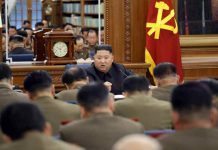It is positive that the Sunshine-Policy failed. The purpose of the Sunshine-policy was reformation and liberalization of N. Korea. Yet, for 8 years of the policy, N. Korea has driven itself to the opposite direction. It went not from abandonment of its nukes to international aid to reformation and liberalization, but from missile launches to a nuclear test. Above all, the life of the North Korean people has not become better. It is a positive proof confirming that the Sunshine-policy –aiding N. Korea would help the Kim Jong Il’s regime go forwards reformation and liberalization- failed. Then, what should we do now? From now, we should rebuild a strategy for N. Korea. DailyNK started a series of reports to find out a new, exact, efficient and feasible strategy for N. Korea. We welcome your active participation and columns.
There are two aspects showing that the Kim Jong Il’s regime is not a normal country.
[imText1]One is that the Kim Jong Il’ regime is deeply involved in the criminals like the Mafia such as drug, counterfeit dollars, shame tobaccos and abduction. The other is that N. Korea does not comply with international human rights regulations, and even let its people die of starvation half-intentionally.
If these two aspects are improved, its international image would be much better. Then N. Korea could make good conditions for its reformation and liberalization. Unless such aspects do not get better, liberalization not only of Shinuiju but also of Sunbong would not be successful.
For reformation and liberalization of N. Korea to be successful, the South Korean government first should pressure or aid N. Korea step out of its disgrace 1) Criminal State 2) Worst human rights country.
Then when should we pressure or aid? It is simple. If N. Korea takes positive actions, aid it and if negative actions, pressure it.
Root out international crimes and improve its human rights.
The alternative we suggest is ‘N. Korea-Normalizing law’(Temporary name).
The ‘N. Korea-Normalizing law’ consists of two parts. One is about crimes of the Kim Jong Il’s regime, and the other is about the improvement of human rights of N. Korea. Each part would contain how and when to pressure and aid.
For example, to pressure the Kim Jong Il’s regime, the South Korean government needs to give prizes to defectors and their families who provide criminal evidences of N. Korea. If one provides specific evidence of drug, counterfeit dollars and abduction, the South Korean government should give better incentives and secure him or her. Maybe it would be possible that if he and she wants, they could live in the U.S or other countries.
In the aid part, the South Korean government should give incentives to N. Korea, if it proves that it stopped international crimes to an international supervisory commission.
N. Korea is now on the list of terrorist countries of the U.S. One of the reasons is that the abduction problems of N. Korea remain unsolved. The South Korean government needs to suggest a carrot to N. Korea that if N. Korea solves the abduction problems, it would strike N. Korea off the list.
Plus, it would aid the legal accounts of N. Korea not to be cut out in the normal foreign transactions by giving a guarantee to the accounts.
Possible to aid N. Korea if it tries to improve its human rights.
The same goes for human rights. In that part, pressures and aids should be involved. The means to pressure N. Korea to comply with the international demand for improving human rights could be financial aids to organizations for improving N. Korean human rights. We can fine out similar precedents in the cases of U.S, Japan and N. Korea.
If N. Korea tries to improve its human rights, the South Korean government should provide supporting policies. For example, it should open the list of political crimes and release all people innocent under the international laws. Aftermath, it should secure them to live without the threat of N. Korea by allowing international human rights organizations to stay in N. Korea with financial aids.
West Germany spent 3,440,000,000 marks from 1963 to 1989 on the condition of releasing political offenders of the East Germany. It contained supplementary living allowances for political offenders.
Especially, the emphasis on the N. Korean human rights will contribute to forming alternative power to the Kim Jong Il’s regime. It has been effective in inducing a change of N. Korea. Kim Jong Il does care about international public opinion. Because of it, the more pressure, the more effective to the policies of N. Korea. The representative example is relieved penalty against defectors. Open execution to death was changed into indoor execution, and frequency dropped.
If monitoring the N. Korean human rights is reinforced, the Kim Jong Il’s regime would not kill or send the opposites to prisons. This would make a condition favorable for the alternative power.
We should not use human rights as a means of changing the Kim Jong Il’s regime. Human rights are itself purpose. If the Kim Jong Il’e regime makes a positive contribution to the improvement of its human rights, then the South Korean government should aid it. Particularly, it should make great efforts on traveling freedom, moving freedom, job freedom making great impact on the N. Korean people. These should be involved in the ‘N. Korea-Normalizing law’.
Finally, the South Korean government voted for the 2006 U.N resolution. In principle, the South Korean government would vote for the ‘N. Korea-Normalizing law’ for ending international crimes and improving the N. Korean human rights. In the Wori party are voices for the N. Korean human rights. It would be possible for the ‘N. Korea-Normalizing law’ to pass in the current government if with the Grand National Party, Democratic party and Open Wori party




















